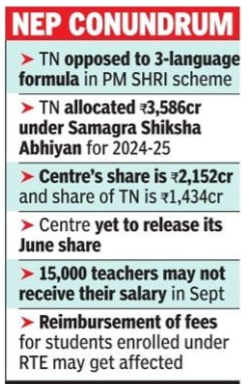Centre Withholds Education Funds for Tamil Nadu Over NEP 2020 Dispute
(Source – Indian Express, Section – Explained- Page No. – 14)
|
Context |
|
Analysis of the news:
The Language Debate in Tamil Nadu
-
A major contention between the BJP-led Centre and DMK-ruled Tamil Nadu is the three-language formula of NEP 2020.
-
Tamil Nadu has historically opposed Hindi imposition and follows a two-language policy (Tamil and English).
-
Unlike other southern states, the state has a long history of anti-Hindi agitations, making language a deeply political issue.
Historical Context of the Language Policy
-
The University Education Commission (1948-49), led by Dr. Sarvepalli Radhakrishnan, initially suggested Hindi as the federal language while recognizing the necessity of continuing English.
-
This led to the three-language formula, formally adopted by the Kothari Commission (1964-66) and incorporated into the National Policy on Education (1968). The policy aimed to promote regional languages, Hindi, and English for better national integration.
Evolution of the Three-Language Formula
-
The National Policy on Education (1986) under Rajiv Gandhi and the NEP 2020 retained this formula but allowed flexibility.
-
Unlike previous policies, NEP 2020 does not mandate Hindi, stating that students can choose any two Indian languages along with English.
-
In theory, this allows states to bypass Hindi entirely, but Tamil Nadu remains wary of any indirect imposition.
Centre’s Changing Stance on Education Policy
-
Education is in the Concurrent List, meaning both the Centre and States have jurisdiction.
-
Historically, the Centre maintained a recommendatory role, however, the Ministry of Education has now linked Samagra Shiksha funds to the implementation of NEP 2020, shifting towards coercive federalism by pressuring states into compliance.
Implications and Way Forward
-
The Centre’s decision to withhold funds risks disrupting Tamil Nadu’s school education system.
-
The move raises concerns about fiscal federalism, state autonomy, and the equitable distribution of centrally-sponsored schemes.
-
A dialogue-driven approach is needed to balance national integration goals with regional linguistic and educational preferences, ensuring cooperative federalism in policy implementation.
|
Significance of the Three-Language Formula |
|
|
Practice Question: Discuss the implications of the Centre withholding Samagra Shiksha funds for Tamil Nadu due to its non-implementation of NEP 2020. How does this reflect the broader challenges of federalism and education policy in India? (150 Words /10 marks) |



